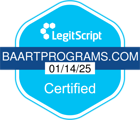Heroin detox takes courage. A patient who received help at BAART Southeast in Los Angeles said, “I was afraid as an addict, and afraid to come in for help.” But he did it, and he found a new life of sobriety. Addicts who want to make a change and go through heroin detox may be encouraged by understanding the process that it takes to overcome a potentially fatal addiction.
The pain of withdrawal is intense. People who just stop using on their own because they want a heroin detox are rarely successful. The tendency to relapse is likely for people who are alone. Consequently, death from overdose is a real possibility for people who relapse. You need support. And for the best chance for success, you need medication assistance to transition your body off of the heroin.
Heroin Detox Symptoms
You know when your body is detoxing, because your body is telling you that it needs the opiates to function. First, you feel nauseous, with stomach pain or cramps, you’re sweaty, shaky, nervous or agitated. You also feel depressed or hopeless. These heroin detox symptoms are the reason that it’s not a good idea to go it alone. Medication assistance eases the symptoms to get you through those first 3-4 days and begin to stabilize. Finally, monitoring by medical professionals ensures that you have the right amount of methadone or buprenorphine to deal with the heroin detox symptoms.
How To Prepare For Heroin Detox
When you’re really ready to quit, keep your mind focused on the goal and seek help. Withdrawal symptoms begin from 6 – 12 hours after your last dose. Medication-assisted treatment will begin after a day so that you can be put on the correct dosage. Tell yourself that you can make it through this day. Get support from loved ones who are not using. Trust that the doctor has your best interest in mind. They do this every day, and see many different circumstances. The goal of heroin detox is to stabilize your body so that you can move forward and make the changes you want to make. Your experience of withdrawal from heroin depends on things like how long you used and how much heroin you were taking. Your doctor will monitor blood pressure, heart rate, temperature and breathing to keep you safe while going through medication-assisted withdrawal.
What Happens After Heroin Detox
After you go through the detox and your body stabilizes, the process of recovery begins. You have the opportunity to create a new life on different terms than being addicted. Always remember that you’re not alone. You will be on medication, such as methadone or buprenorphine, so that you can remain free of the craving for heroin. These medications actually block the sensations that heroin gives your body. Counseling and support is also an important part of the process of recovery. You want your world to change, and it will. But now what? The ‘friends’ that you had may still be using. Counseling and support help you deal with the changes. You understand what took you down the path to addiction, and you learn new tools for a healthier lifestyle and healthier relationships. You have the opportunity to interact with other people who have been where you are.
Don’t be afraid and don’t give up. Hope and support are available. If you’re in southeast Los Angeles, one of the resources is BAART Southeast.


